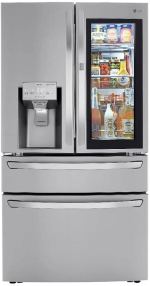Why Refrigerator is Not Cooling?
And Simple Tips to Fix it!!
We get asked all the time why refrigerator is not cooling. We know first hand how having a fridge stop cooling on you can be unbelievable inconvenient and expensive!
When your refrigerator stops cooling properly, it can throw your daily routine off balance. We completely understand how crucial it is to have a working refrigerator to keep our families fed and happy.
In this article, we'll explore common reasons why your fridge may not be cooling and provide practical troubleshooting tips that you can try at home. Let's dive in and get that fridge back to its cooling best!
There is nothing worse than opening up your fridge and finding out that it hasn't been cooling for any period of time. The questions start coming fast and furious: Having lived through this process more than once and helped thousands of others through it first we want to say, "Breathe. We've got you and there could be an easy reason/solution to fixing it." Now that you're feeling a little less alone in this process lets talk about the most common reasons (plus solutions on how to fix them) a refrigerator is not cooling. Here's our top 8 reasons why refrigerator is not cooling: We know it sounds too simple to be true but the first thing to do is to check the temperature settings on your fridge. If you're not sure what temperature to have it set to the recommended level for a fridge is usually around 37°F or 3°C and a freezer should be at 0°F or -15°C
for the freezer. If you check it and see that it's set too high, adjust it back to the proper temperature and check back in a few hours to see if this fixes it. It may seem too simple to be true but often times why refrigerator is not cooling has to do with something as simple as an external electrical issue. Kids can be curious and accidentally unplug appliances. If that isn't the case, also make sure to check for tripped circuit breakers. Any easy way to test an outlet is by plugging in another appliance to ensure it's working correctly. If the other appliance works and the fridge still doesn't turn on, it's a good time to call in a professional. Something that might not be as obvious as a solution is to check on your refrigerator's condenser coils. If they are dirty or covered in dust and lint it could be part of the problem. Think of a dirty compressor like a dryer having trouble drying with full lint filter. It basically makes it harder to do what it's supposed to. Here's the good news: Cleaning the condenser coils is easier than it sounds. The coils are usually located at the back or bottom of the fridge and accumulate dust and grime over time. The easiest way to clean them is to use a vacuum cleaner or a soft brush and gently clean the coils. This type of cleaning on a regular basis can significantly improve your fridge's performance. Another simple issue can be if the condenser fan of your refrigerator isn't working. You'll want to take a look to see if the condenser fan is spinning. How much frost are on your evaporator coils? A little bit or do you have a mountain of ice covering them? If you're not careful excessive frost or ice buildup on the evaporator coils can disrupt the cooling process. If you have the Abominable Snowman at the back of your freezer then it sounds like you might have a faulty defrost system. The solution is to try defrosting your fridge and see if the problem goes away. (You can unplug it & let it melt on it's own or get in there with a hair dryer to speed up the process. Just make sure you dry everything off before plugging it all back in.) Once you've defrosted your fridge, if the frost continues to accumulate, it is definitely time to bring in a professional to diagnose and fix the problem. Take your time inspecting the door seals or gaskets for any signs of wear, cracks, or tears. Something as simple as a torn or loose door seal can allow the cool air to flow out of your refrigerator easily. It can be easy to accidentally damage a seal while closing the fridge in a hurry. To see if it's still working, close the door on the edge of a piece of paper and try to pull it out. If it slips out easily, the seal needs to be replaced. Good news is it's easy to buy replacement kits and replace them yourself. If you've come this far and nothing has helped then it's time to look for something deeper. Take a look around the edges of your fridge for an oily or greasy residue. This indicates a possible refrigerant leak. If you have one then this can significantly impact cooling performance and it's crucial to contact a professional that is experienced in handling refrigerants to safely diagnose and repair the leak. At this point it's time to get to the heart of the matter -- you may have a problem with your compressor. The compressor is a vital part of the cooling cycle. If it's , the fridge won't not doing it's job then your refrigerator can't cool properly. When it comes to dealing with compressor issues, you will need to find a refrigerator repair person who has an expertise in working with compressors to repair or replace it. There are several reasons why you need to call a repair person to fix a refrigerator that isn't cooling. While some issues can be resolved through the basic troubleshooting steps we mentioned above. Though persistent problems may require professional intervention. Here are a few reasons when it's time to bring someone in: Remember, while the idea of fixing it yourself and saving money may sound tempting but repairing complex refrigerator issues without proper knowledge and tools can be risky and might make things worse. Bringing in a knowledgeable repair person makes sure the problem is diagnosed accurately and resolved effectively, helping you to prolong the lifespan of your refrigerator and save on replacement costs. We know that often you might need more information to solve you problem. Here are a few more pages that might help: How to shop for a refrigeratorWhy Refrigerator is Not Cooling:
Common Causes
Why Refrigerator is not Cooling:
8 Possible Reasons1. Check the Temperature Settings:
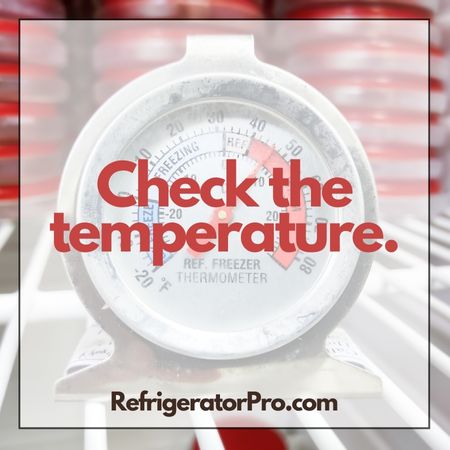
Often temperature dials can be accidentally adjusted, causing the temperature to rise and there's nothing worse than having to pay for a service call for something as simple as a dial that's too high.
2. Check the Power Supply:
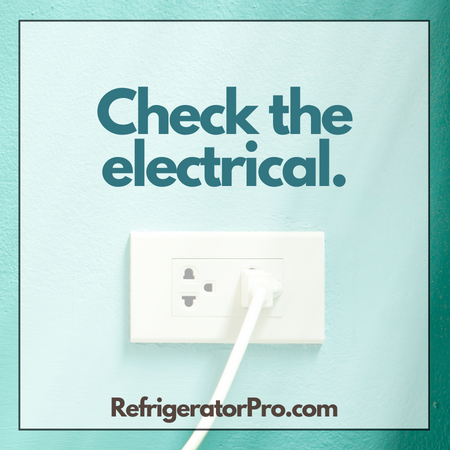
3. Check Condenser Coils:
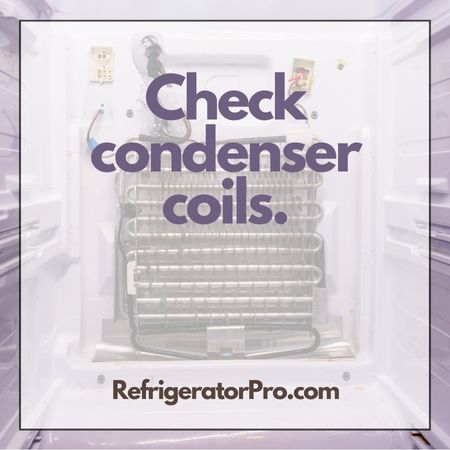
4. Check Condenser Fan:
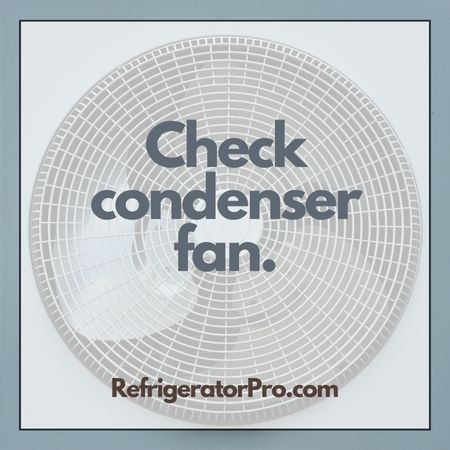
The reason why this is so important is because it helps to circulate air over the coils and if it is obstructed by any objects this can keep it from cooling.
Make sure to clear any blockages from in front of it and check to be sure that the fan is also clean. Once these steps are done if it's still not functioning, then our gut would be to call in a professional repair person to see if they can fix the fan or replace the fan motor.
5. Check Evaporator Coils:
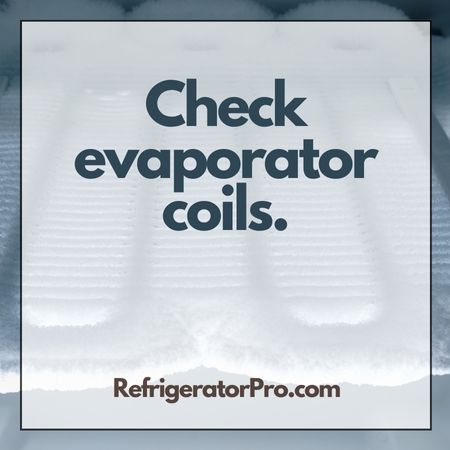
6. Check Door Seals:
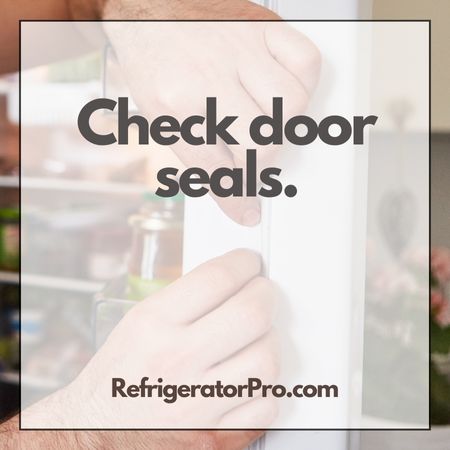
7. Check for Refrigerant Leak:
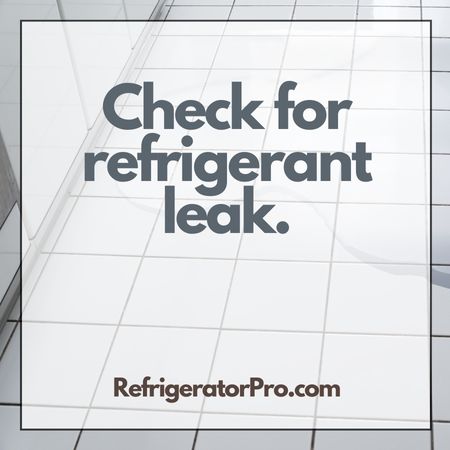
8. Check the compressor:
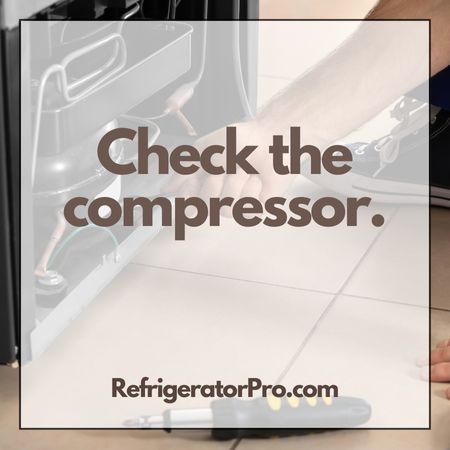
Ways to know if this is the case is to listen for any unusual noises or notice any excessive heat coming from the compressor.
Why Refrigerator is Not Cooling?:
When Should I Call a Repair Person?

Why Refrigerator Not Cooling:
Other pages that might interest you
Why do refrigerators make noise?
Recent Articles
-
Top 10 Refrigerators 2025 - Editor's Picks and Reviews
Jun 24, 25 03:58 AM
Discover the Top 10 Refrigerators 2025. Our editors rank the best models for every budget, kitchen size and style -- and help you find the best price. -
LG, Bottom Freezer, LDC22720ST
May 02, 24 01:00 AM
Bought an LG Bottom freezer refrigerator from a well known explanation point department store. And purchased the 10 year warranty for major components. -
Is it safe to set a full size refrigerator on carpet?
Jan 18, 24 05:18 PM
I have a full size refrigerator with top freezer. Is it safe to run it setting on a carpeted floor, if not what can I put under it? The unit is brand

